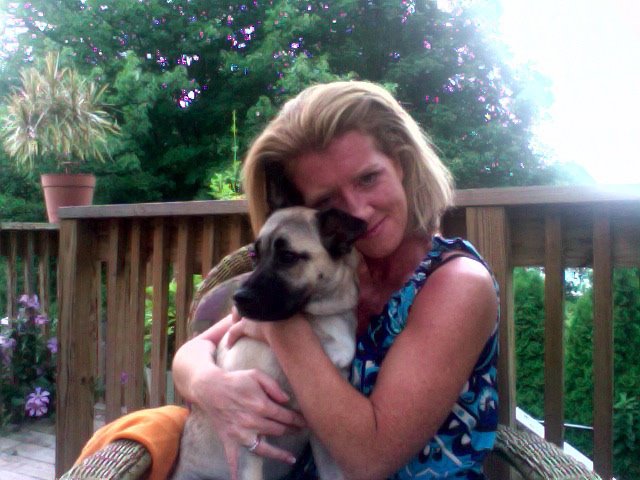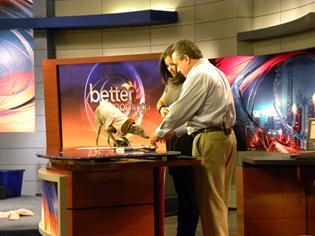Monique A. Honaman is the author of The High Road Has Less Traffic, a straight from the heart, inspirational and humorous guide to navigating love relationships and divorce. In the book, she shares her personal journey so that others can learn from it…but make no mistake, this is not some dry self help book. This is a pull-no-punches, tell-it-to-me-straight and make-me-laugh-through-the-hard-parts read.
Thank you, Monique, for sharing your story with our PBS members.
PBS: Have you ever written anything before? Why did you feel compelled to write this book?
I did feel compelled to write this book about taking the high road after I was forced to make a similar choice myself when I experienced a relationship implosion of my own, and suddenly found myself staring down the face of divorce. I quickly came to realize the kind of pain and destruction that divorce can inflict on others, especially on children. I decided that I would take my experience and turn it around to help other women who were in the same situation. I began to counsel women facing relationship troubles and divorce, and before I knew it I was fielding calls and emails weekly from women who were friends, or friends of friends, or friends of acquaintances. I found that there were certain pieces of advice that resonated with my newfound circle of friends. I decided to package my experiences and insights into a book that summed up my personal philosophy: that the high road has less traffic, less breakdowns, and more room to accelerate toward your destination. Given a choice, the high road is the best path to take in life, especially when dealing with marriage and family!
I love to read and when I was going through my divorce, I was looking for that book that would be that “girlfriend” who would really lay it on the line for me – who would be funny, raw, honest, smart, let me cry, and make me laugh. I couldn’t find that book, so I guess I took matters into my own hands. While I had written business articles in the past, I had never written (or attempted to write!) a book.
I sat down one night and just began outlining chapters of advice that told my story and how I dealt with my divorce. I thought about all the things I wish I knew, or all the things that people were calling me about. Things like how to tell your kids, how to tell your friends, why telling your mom is one of the hardest things to do, who you need to include in your support network (like a CPA and your gynecologist!), how to hire an attorney, how to adjust to those times when your kids are gone for the first time, how to find forgiveness (I joke about how I went from dropping the F-bomb, to finding a more powerful F-word in forgiveness!), how to start dating again, and how to learn more about yourself so you don’t make the same mistakes again. Before I knew it, I had 22 chapters outlined and it went from there. It was cathartic for me, and it’s been so helpful to others.
PBS: While the idea behind the book is how to take the high road while navigating a divorce, it is actually full of information and ideas about how to manage a marriage and never actually reach that point. Comments?
Yes! When I began to write the book, I envisioned my audience would be women going through divorce. As it evolved, the thoughts began to encompass words of wisdom about maintaining healthy relationships, thoughts about the power of forgiveness in any context, thoughts about being true to yourself, and thoughts about taking the high road in every aspect of life. The response that I have received from both men and women, single, married and divorced, young and old, has been incredible. There are certainly portions of the book that are really relevant to anyone.
One of favorite pieces of feedback came from a married man who told me he read the chapter on making sure you do the little things in marriage. He told me how he made coffee for his wife the morning after reading my book and brought it to her as she got ready. She was thrilled. His message was this: it only took my 5 minutes, but the payback was tremendous. Another married woman told me as a result of reading the book, she and her husband had sat down and really discussed their finances and were able to make some joint decisions about saving and spending. Their communication improved greatly!
PBS: What advice does your book have for women who are on the fence about what to do or who are facing the hard decision of making this huge change in their life?
My advice is this: relationships are hard work and need to be tended to on a daily basis. You can’t get lazy. Divorce is difficult. Regardless of the circumstances, it’s hurtful and damaging. I am not a proponent of divorce. I encourage people to make sure that they aren’t rushing to the decision to divorce. Often times people can rebuild their relationships, and frankly, make them stronger than they previously were because of renewed communication and intimacy.
On the other hand, there are those marriages which are clearly over. In those cases, I encourage both parties to ‘take the high road’ in dissolving the marriage. No matter how hateful or bitter things have become, these two people were at some point in love enough to exchange vows and get married. Too often divorce leads to low road behavior which is negative and hurtful to all involved … the husband and wife who once pledged true love, any children who may have been born from this marriage, the extended family, the friends … the ripple effect is tremendous. Taking the high road is the best way to get through this situation and still be to look at yourself in the mirror!
PBS: We’ve all heard the saying “nice guys finish last”? Some might feel that taking the “high road” is just another example of women being expected to the “nice” one and not assert themselves or stand up for what they need. What are your thoughts on this?
I disagree! Taking the high road does not imply being a door matt that others can walk on. Finding forgiveness doesn’t mean you aren’t going to hold the other person accountable for their actions. It doesn’t mean there aren’t consequences for certain behaviors. What is does mean is that you aren’t going to stoop to low-road behavior as well. Taking the high road means engaging in behavior that allows you to look in the mirror every day for the rest of your life knowing that you did what is right by yourself, your family and your friends. Being nice does not equate to being a doormat. You can be assertive, stand up for your rights, and take the high road all at the same time. This is not mutually exclusive behavior. I argue that you accomplish a lot more in life by treating others with respect and kindness, than with low road behavior.
PBS: What advice can we give our children now, especially daughters, to help them later should they ever be in these types of difficult situations?
Great question. I don’t think anyone ever marries with the expectation that they will find themselves divorced in the future. That being said, 50% of marriages in the US end in divorce. The high-level advice I give to my children is that they need to always take the high road and be honest in everything they do. The practical advice that I will give my children is that need to constantly work on their relationships, that they need to always maintain some level of awareness of their financial situation, and that they need to maintain marketable, employable skills.
PBS: If you find yourself already on the “low road” in a divorce situation is it too late to move over to the “high road”? What happens if you are trying to stay on the “high road” but fall off from time to time?
It is never too late to get off the low road and switch lanes to the high road! It will make you feel better! People often tell me that it’s hard to stay on the high road when their partner is engaging in low road behavior. Yes, it is! But, if you stay focused on what’s important to you, you can avoid getting sucked into that behavior as well. I’ve found that focusing on being a strong role model for your children is often the motivation that people need to get on, and stay on, the high road.
Every study out there about how children of divorce fare in the future highlights the post-divorce interactions between their parents as being indicative of how well they cope with being “children of divorce” in the future. To me, that was all the motivation I needed to be sure that my ex- and I handled the divorce, and our post-divorce communications, in a high road manner. We will be forever bonded by our two children and they don’t want to see their parents not getting along constructively. The guilt that comes along with that is huge, and I don’t want my kids, who are innocent bystanders in this divorce, to have to deal with those emotions. The reality is that we now have to co-parent together, and it’s much easier to do that when we are able to communicate about our children constructively.
PBS: Looking at you now, so pulled together and happy, it is hard to believe you ever hit the low point you describe…how long did it take you to reach this new, good place in your life?
Yes, I am incredibly happy now, and in a way I never imagined. And yes, being blindsided by divorce was clearly my low point. I was incredibly bitter, angry and hateful. I was emotionally fragile. It was difficult to concentrate. These are all incredibly natural feelings that every person has to navigate through. Kind of like Elizabeth Kubler Ross’s stages of death and dying, I believe there are natural stages of emotion that every person going through a broken relationship must also deal with. I also believe that there isn’t a specific timeline as to how long these stages must last. Some people go through these faster than others.
We can probably all think of someone who is holding onto a grudge for something that someone did to them at some point in the past. They can recall every single detail of the ‘infraction’ and they relive it and rehash it every day. That is so tiring and burdensome. It holds you back and keeps you locked in the past. And frankly, the person against who you are holding the grudge is moving on with their life and completely unaware (or doesn’t really care) that you are stuck rehashing this every day. It’s only hurting that person, not anyone else.
As I looked in my life, I did see a few people who had been ‘wronged’ in the past who had never made that decision to forgive. Decades later they were still holding onto bitterness and anger and I knew I didn’t want to live that way. I knew I would have to find forgiveness in my heart in order for me to heal and start moving forward. The decision to forgive was absolutely life-changing for me. Holding onto the anger and bitterness was only hurting me. Nobody else, just me! I learned that forgiveness is a selfish act. I made the decision to honestly find forgiveness in my heart and I felt better. I didn’t need anyone else’s approval or blessing to forgive. I felt the burden lift. I went from being consumed with anger, to being able to see the future and think more logically rather than so emotionally. Carrying around negativity and anger are not attractive features that inspire people to want to hang out with you! I know I would never have started dating and remarried if I hadn’t found forgiveness and begun to move forward with positive momentum.
PBS: Was the decision to remarry difficult for you? What were your fears?
You would think the decision to remarry would have been a difficult one for me, but actually it wasn’t. When I met my husband, I immediately felt such a strong connection and we communicated so well, that any fears I had (and I did have them!) were immediately discussed and dismissed. You can’t (or rather, you shouldn’t) go through a divorce without turning the mirror onto yourself and learning more about who you are and what role you played in the demise of the marriage. This can be really difficult to do. It can be painful and raw, but it’s so important. I had taken a deep, introspective look at myself, what I contributed to relationships, and what I wanted out of relationships. Entering into a new relationship, and subsequent marriage, I was incredibly clear on what I wanted, and the importance of keeping that connection alive. I tease my husband now that I don’t keep things bottled up … any emotion I have gets expressed immediately … what I like, what I don’t like … and I encourage him to do the same. That level of communication is very healthy for our relationship.
PBS: Do you have a mantra or personal pep talk you give yourself when things get tough?
Yes! I live by many mantras. I love quotes, and I have signs all over my home expressing certain thoughts that I choose to live by. In fact, every chapter in my book starts with a quote relevant to that chapter. Readers have really responded to these quotes and often email me telling me how much a certain quote has really spoken to them.
One of my favorite mantras that I rely on every day is: “I can’t control what happens to me, I can only control how I react to it.” My kids each have a plaque in their room that says: “Integrity is doing what is right even when no one is looking.” Lastly, I have a strong faith and love the verse from Jeremiah 29:11 that says “’I have a plan for you’, declares the Lord, ‘plans to prosper you and not to harm you, plans to give you hope and a future.’”
Please add your comments!
Monique will be reading the comments and respond to specific reader questions. We will choose from the comments to award 2 lucky winners an autographed copy of The High Road Has Less Traffic. Winners will be chosen at random.
Congratulations to Kaoru Y. and Adrienne! They will both receive an autographed copy of The High Road Has Less Traffic! Thanks for your comments…..
The High Road Has Less Traffic is available for purchase in the PBS Market






 Jess Lourey is the author of the Lefty-nominated Murder-by-Month series set in Battle Lake, Minnesota.
Jess Lourey is the author of the Lefty-nominated Murder-by-Month series set in Battle Lake, Minnesota.








